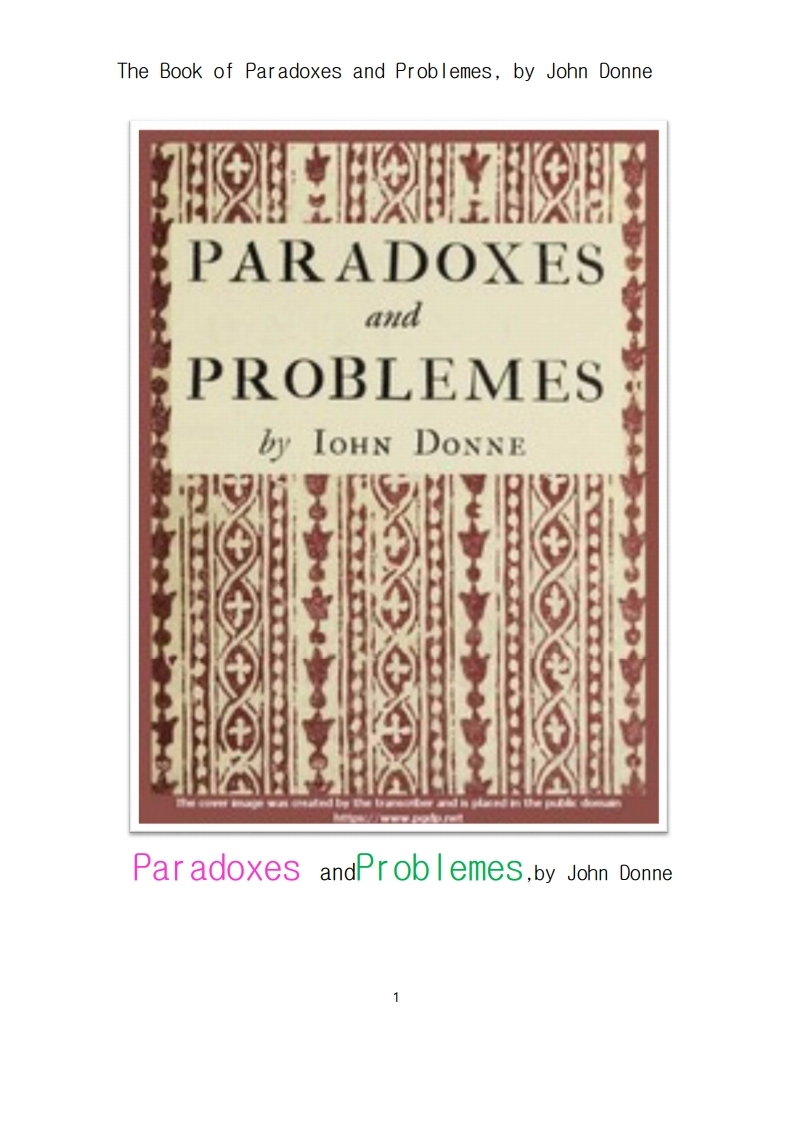논리 철학에서의 역설과 문제들.The Book of Paradoxes and Problemes, by John Donne
C O N T E N T S
? PARADOXES
1. A Defence of Womens Incon?tancy: P. 1.
2. That Women ought to paint: P. 6.
3. That by Di?cord things increase: P. 9.
4. That good is more common then evill: P. 12.
5. That all things kill them?elves: P. 15.
6. That it is po??ible to find ?ome vertue in Some Women: P. 17.
7. That Old men are more fanta?tike then Young: P. 19.
8. That Nature is our wor?t Guide: P. 21.
9. That only Cowards dare dye: P. 24.
10. That a Wi?e Man is knowne by much laughing: P. 26.
11. That the gifts of the Body are better then tho?e of the Minde: P. 30.
12. That Virginity is a Vertue: P. 34.
? PROBLEMES
1. Why have Bastards be?t Fortune? P. 40.
2. Why Puritanes make long Sermons? P. 42.
3. Why did the Divel re?erve Je?uites till the?e latter dayes: P. 43.
4. Why is there more variety of Green then of other Colours? P. 44.
5. Why doe young Lay-men ?o much ?tudy Divinity: P. 45.
6. Why hath the common Opinion afforded Women Soules? P. 47.
7. Why are the Faire?t, Fal?e?t? P. 49.
8. Why Venus-?tar only doth ca?t a ?hadow? P. 51.
9. Why is Venus-?tar multinominous, called both He?perus and Ve?per: P. 54.
10. Why are New Officers lea?t oppre??ing? P. 56.
11. Why does the Poxe ?o much affect to undermine the No?e? P. 58.
12. Why die none for Love now? P. 60.
13. Why do Women delight much in Feathers? P. 61.
14. Why doth not Gold ?oyl the fingers? P. 62.
15. Why do great men of all dependents, chu?e to pre?erve their little Pimps? P. 63.
16. Why are Courtiers ?ooner Athei?ts then men of other conditions? P. 64.
17. Why are ?tate?men mo?t incredulous? P. 66.
18. Why was Sir Walter Raleigh thought the fitte?t Man, to write the Hi?torie of the?e
Times? P. 68.
? CHARACTERS
1. The Character of a Scot at the first ?ight: P. 69.
2. The true Character of a Dunce: P. 71.
? AN ESSAY OF VALOUR: P. 75.
도서소개
저자소개
목차소개





